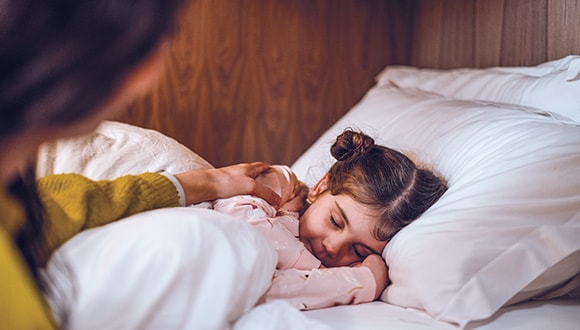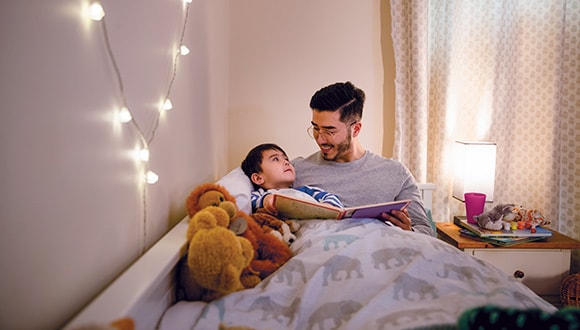How much sleep do kids need?
Published May 2025 | 5 min read
Expert contributors Associate Professor Margot Davey, Director, Melbourne Children's Sleep Centre; Professor Sarah Blunden, Head of Paediatric Sleep Research, Appleton Institute
Words by Beth Wallace
Is your child getting enough good-quality sleep? We explore how much sleep young children need and what you can do to support them.
Did you know one in three Australian children has trouble falling or staying asleep?
Given that sleep lays the foundation for our physical and mental health, it’s important to address sleep challenges, says Professor Sarah Blunden, a clinical psychologist and Head of Paediatric Sleep Research at the Appleton Institute, CQ University Australia.
“If sleep doesn't go well, many of the things we do – like concentrate, problem-solve and behave – are compromised,” she says.
What causes poor sleep in children?
A range of behavioural and physiological factors contribute to sleep issues in toddlers and primary school-aged children, explains Associate Professor Margot Davey, a paediatric sleep physician and Director of the Melbourne Children's Sleep Centre at Monash Children’s Hospital.
“Rather than finding a blanket solution, you need to step back and work out why these issues are occurring,” she says.
Many cases she sees stem from behavioural issues. These are the actions that create poor sleep habits, like when children:
- don’t want to sleep in their own bed
- need help settling
- feel anxious about going to or staying in bed
- have irregular sleeping schedules and times – for example, going to sleep much later some nights.
Poor sleep in children may also arise from sleep disorders, including obstructive sleep apnoea, narcolepsy, restless leg syndrome, sleepwalking and night terrors.
In addition, children with autism spectrum disorder (ASD), attention deficit hyperactivity disorder (ADHD) and certain respiratory or developmental conditions are more prone to sleep problems.

How much sleep do children need?
Australian guidelines recommend children get the following amount of good-quality sleep each day, including naps if relevant.
- One to two years: 11 to 14 hours
- Three to five years: 10 to 13 hours
- Five to 13 years: nine to 11 hours.
Some children may need more or less sleep than the guidelines suggest. Grumpiness is one of the key signs they’re not getting enough, Prof Blunden explains. On the other hand, a primary school-aged child who’s consistently unable to sleep for nine hours could probably manage with less. “You have to watch your child and judge what they need,” she says.
If left unresolved, inadequate sleep can lead to poor memory, trouble concentrating or understanding instructions, tiredness during the day, irritability, and anger and mental health issues like depression and anxiety.
Anna’s experience with nighttime wakes
When Anna’s daughter Paige turned two, she went from being a great sleeper to waking throughout the night. “I felt like I’d been hit by a freight train,” she says. “It was night after night.”
“We followed the usual routines, the sleep habits before bed, but she would wake up constantly with cold sweats. We couldn’t get the temperature right, so she’d wake up and would need to be rocked to sleep by us then we'd carefully transport her back to bed."
Anna started looking around for solutions for the night sweats and found 100% merino wool pyjamas helped Paige sleep longer. Research shows that 100% merino wool can help regulate body temperature and it can also help wick away sweat – which stopped Paige feeling cold.
“We also used a child-friendly lavender room spray, blackout curtains, a soothing music track from Spotify, and a night light that turned off after 20 minutes.”
These solutions all worked and didn't work at various times, says Anna, but in general Paige started to sleep longer, with less disturbances. Now Paige is older (she’s about to turn six) she's sleeping better.
“I still have the music, those pyjamas and the night light… I’m too nervous to stop doing those things in case she wakes up a lot like when she was little. I’ll probably keep doing them until she’s 18,” laughs Anna.

6 ways to encourage good sleep habits in children
While sleep disorders may need medical attention, behavioural sleep problems can often be fixed with good sleep hygiene and a suitable sleep routine. Here are six ways to create the perfect environment for your child to sleep better.
1. Stick to a schedule
Going to bed at the same time each night helps your child’s internal body clock get into a regular rhythm. Research shows this helps them fall asleep quicker, sleep longer and wake less often.
2. Establish a consistent bedtime routine
The ideal bedtime routine should include quiet, calming activities about half an hour before lights out, says Assoc Prof Davey. “Whether this involves having a bath, cleaning teeth, reading stories, chatting or singing, it’s about finding a ritual that helps the child wind down.”
3. Create the right environment
Your child’s bedroom should ideally be quiet, comfortable and dark enough for them to sleep, have a temperature that’s not too hot or too cold (about 20 to 22°C) and be free of distractions like electronic devices.
Music and similar ‘tools’ set up the routine and environment for sleep, says Prof Blunden, adding that children can also respond well to white noise or child-appropriate meditations.
4. Reduce screen time
Screens on TVs, phones and tablets release blue light, which blocks melatonin – the hormone that helps you fall asleep. Prof Blunden advises shutting off screens “for at least one hour before bed” and removing devices from the bedroom.
5. Help your child feel secure
Prof Blunden encourages lots of cuddles at bedtime to help your child feel safe. “Give them a torch or set up a nightlight so they can see in the dark, if needed, and make sure they know you’re close,” she says. A ‘special’ nighttime toy can help if they need to hold something to fall asleep.
6. Promote a healthy diet and physical activity
Engaging in the recommended amount of physical activity can help children feel tired enough to fall asleep at bedtime. Likewise, eating a healthy, balanced diet supports better sleep.
Eligible HCF members* can access Healthy Families for Life – resources to support kids, from birth to teens, to develop positive nutritional habits for growth and development and reduce the risk of chronic conditions in their future.
Late to sleep, early to rise
Got a night owl or early bird on your hands? Prof Blunden suggests trialling these strategies:
If your child takes a long time to fall asleep or wakes early:
- push their bedtime back by half an hour
- look at what time they fall asleep and adjust their bedtime accordingly
- limit daytime naps.
If your child wakes during the night:
- find out if they’re actually awake or experiencing night terrors or sleepwalking (if the latter, remove any obstacles from the room and make sure windows and doors are secure)
- let them know they’re safe (a kiss and cuddle might help them resettle)
- teach them habits to help them fall asleep on their own (like snuggling a toy, going to sleep drowsy but awake).
For parents who might be experiencing inconsistent sleep, eligible HCF members^ can access a free 12-month Sleepfit subscription. This evidence-based app helps identify sleep issues and provides solutions for a better night's sleep.
How to support anxious children at bedtime
The evening is a common time for children to experience mental health issues like anxiety. Assoc Prof Davey says parents need to talk to their child to find out whether the anxiety is related just to bedtime or whether it's part of a bigger issue (like school, confidence, friends) that might require support from a mental health professional.
Finding the appropriate bedtime is also key, she adds. “Sometimes if you put a child to bed too early for the time that they can fall asleep, it makes the anxiety worse, as they're lying in bed tossing and turning and the whole thing escalates.”
When to seek help
If you’ve tried, unsuccessfully, to introduce healthy sleep habits – or if your child’s behaviour is negatively impacting you or your family – it might be time to speak to your GP about next steps. This could include spending time at a sleep school.
In some cases, they might prescribe melatonin for kids: a sleep supplement that the Therapeutic Goods Administration (TGA) has approved for use in children between six and 18 years who have neurodevelopmental disorders, including ASD and ADHD.
Prof Blunden says she’s seen a “massive increase” in melatonin use among children outside this cohort in recent years, with many parents buying unregulated products online without a prescription.
“We don't know where it has come from and we don't know what the long-term effects are, so we have to use it with caution,” she says.
Assoc Prof Davey agrees, adding that melatonin isn't a substitute for a good bedtime routine.
“It’s important to be aware of what you’re giving your child,” she says. “Ask yourself why you’re giving it and whether there’s an alternative solution.”
Extra support for your family
Is your child experiencing big feelings or showing signs of stress or anxiety? Calm Kid Central+ is an online educational and support program for parents and kids aged four to 11 with big feelings and emotional challenges. The program includes online courses, games, video lessons and activities, to help children understand and better manage their feelings, act in positive ways, develop good friendships and manage challenging life situations.
These tools are aimed at teaching children to act bravely and confidently, behave in positive ways, develop good friendships and manage tough life situations.
Related articles
Sleep: How much do teenagers need?
Sleep guidelines recommend a teenager needs to get between 8 to 10 hours of sleep every night, especially for ages 14-17 years for good mental health.
An app with advice on how to help your baby sleep
An app delivers trusted baby advice from Tresillian for new parents to help encourage healthy sleep habits and get baby to sleep.
How to build healthy screen time habits for kids
What are the negative effects of too much screen time for kids? Here are some tips on how to reduce screen time and stop short-sightedness in children.
How to improve your sleep quality
Poor sleep can take a toll on your physical and mental health, but these tips can help you identify common sleep issues, so you can start sleeping better.
IMPORTANT INFORMATION
* Eligibility criteria apply. For more information see hcf.com.au/healthyfamilies
^ Eligibility criteria apply. For more information see hcf.com.au/sleepfit
+ Eligibility criteria apply. For more information see hcf.com.au/calmkids
This communication contains information which is copyright to The Hospitals Contribution Fund of Australia Limited (HCF). It should not be copied, disclosed or distributed without the authority of HCF. Except as required by law, HCF does not represent, warrant and/or guarantee that this communication is free from errors, virus, interception or interference. All reasonable efforts have been taken to ensure the accuracy of material contained on this website. It’s not intended that this website be comprehensive or render advice. HCF members should rely on authoritative advice they seek from qualified practitioners in the health and medical fields as the information provided on this website is general information only and may not be suitable to individual circumstances or health needs. Please check with your health professional before making any dietary, medical or other health decisions as a result of reading this website.